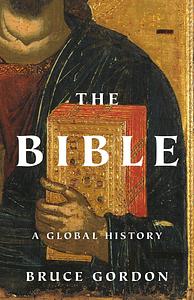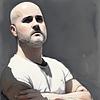Take a photo of a barcode or cover
challenging
informative
slow-paced
informative
slow-paced
challenging
reflective
slow-paced
An interesting history, but a very slow read.
informative
slow-paced
informative
inspiring
medium-paced
This book deserves another read-through and a commitment to revisit it annually. It’s like a buffet; there is so much information that one can pick and choose what satisfies one's needs at any particular moment.
I was interested in the journey of the Christian bible and Gordon’s research presented me with more than I anticipated.
Author Bruce Gordon describes the bible as “the most influential book in the world” and “the most global of books” and describes it as a “story of the divine conversation that was never limited to bound pages.”
He begins (and the part I was most interested in) by defining ‘bible’ and introduces readers to Athanasius, a controversial and combative bishop in Alexandria who, in 367 CE, listed 27 books of the New Testament which he regarded as ‘canon’. His was the first list and was a turning point in determining the Bible's contents. Gordon continues with exciting scroll discoveries, production at Tours, and the translation by King Alfred. The next section was a little more familiar to me, but I appreciated the refresher on the journey of the Reformation and the King James Bible. I wasn’t as interested in the Transatlantic Bible chapters to the end (chapters 8 - 14), and I admittedly flitted through these chapters. This is by no means my final read-through. I know that I’ll go back and learn and relearn. This is an excellent resource that I’m excited to possess.
Things that gave me pause:
- Being in possession of these texts (bible) incurred grave risks
- Bible wasn’t invented by Christians but “emerged from their interaction with Roman society.”
- The codex “became a means by which Christianity distinguished itself from Judaism and Roman culture.”
- How Constantine the Great’s wish to have 50 bibles for his churches in Constantinople required “the skins of approximately 350 calves or sheep” for each one.
- The (almost not) discovery Constantin von Tischendorf made in the deserts at Cairo
I went down a rabbit hole researching the two surviving codices (Codex Sinaiticus and Codex Vaticanus) to see for myself where the bible as a book originated. How wonderful that these are available online!
The most important thing you need to know is that this book, although written by someone gifted in their field, is accessible to us all. It reads like a conversation and I was able to put it down several times and pick it up again without feeling like I needed to reread to remember what I’d previously learned. I’d claim that this is a necessary tool for the inquisitive.
I was gifted this copy by Basic Books and NetGalley and was under no obligation to provide a review.
I was interested in the journey of the Christian bible and Gordon’s research presented me with more than I anticipated.
Author Bruce Gordon describes the bible as “the most influential book in the world” and “the most global of books” and describes it as a “story of the divine conversation that was never limited to bound pages.”
He begins (and the part I was most interested in) by defining ‘bible’ and introduces readers to Athanasius, a controversial and combative bishop in Alexandria who, in 367 CE, listed 27 books of the New Testament which he regarded as ‘canon’. His was the first list and was a turning point in determining the Bible's contents. Gordon continues with exciting scroll discoveries, production at Tours, and the translation by King Alfred. The next section was a little more familiar to me, but I appreciated the refresher on the journey of the Reformation and the King James Bible. I wasn’t as interested in the Transatlantic Bible chapters to the end (chapters 8 - 14), and I admittedly flitted through these chapters. This is by no means my final read-through. I know that I’ll go back and learn and relearn. This is an excellent resource that I’m excited to possess.
Things that gave me pause:
- Being in possession of these texts (bible) incurred grave risks
- Bible wasn’t invented by Christians but “emerged from their interaction with Roman society.”
- The codex “became a means by which Christianity distinguished itself from Judaism and Roman culture.”
- How Constantine the Great’s wish to have 50 bibles for his churches in Constantinople required “the skins of approximately 350 calves or sheep” for each one.
- The (almost not) discovery Constantin von Tischendorf made in the deserts at Cairo
I went down a rabbit hole researching the two surviving codices (Codex Sinaiticus and Codex Vaticanus) to see for myself where the bible as a book originated. How wonderful that these are available online!
The most important thing you need to know is that this book, although written by someone gifted in their field, is accessible to us all. It reads like a conversation and I was able to put it down several times and pick it up again without feeling like I needed to reread to remember what I’d previously learned. I’d claim that this is a necessary tool for the inquisitive.
I was gifted this copy by Basic Books and NetGalley and was under no obligation to provide a review.
informative
reflective
medium-paced
challenging
hopeful
informative
inspiring
reflective
medium-paced
Wonderful book! I learned so very much that I never knew about the translation and transmission of the Bible down through the ages.


